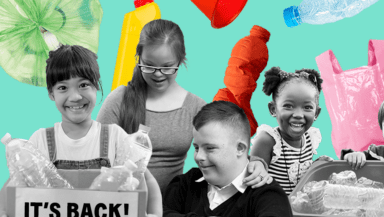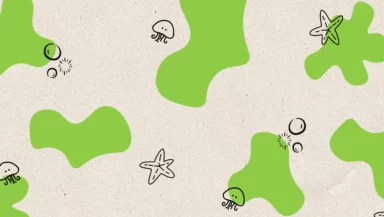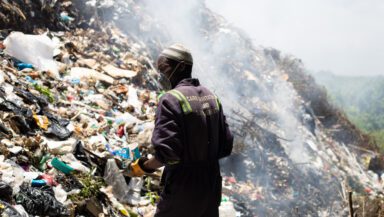- 100,000 participants, including nearly 13,000 school classes and 38 MPs, are counting their plastic waste this week
- The survey results will be announced in mid-April
- Photos and video are available here
London, UK, Monday 11 March 2024—Nationwide, 100,000 participants, including nearly 13,000 school classes, are participating in The Big Plastic Count this week. This vital national survey of plastic waste runs from 11-17 March and is a unique opportunity for households to gather evidence for the government about the extent of the UK’s plastic waste problem. People are joining in across all 650 parliamentary constituencies, and 38 MPs are showing cross-party support.
Participants will tally all the plastic packaging they throw away for one week and submit their results on the website. They will receive a personal plastic footprint showing where their waste ends up—how much is recycled and incinerated, exported, or ends up in landfills. Though the official count week is 11-17 March, participants can sign up at thebigplasticcount.com and start the count any time before 25 March to submit their results by the deadline, 31 March.
Almost a quarter of a million people participated in The Big Plastic Count in 2022, revealing that almost two billion pieces of plastic packaging were being thrown away weekly. This year’s results will be published in mid-April, showing the national picture and whether anything has changed since 2022. The Big Plastic Count is the UK’s largest plastic waste investigation, organised by Greenpeace UK and Everyday Plastic. The results are particularly vital in 2024, the final year of political talks for a global plastics treaty that could finally start to phase down plastic production. The Big Plastic Count 2024 comes after recent reports that the government’s flagship recycling initiative, the Deposit Return Scheme (DRS), first announced in 2018, could be delayed until 2028.
“We’ll use everyone’s evidence from The Big Plastic Count to confront ministers with the scale of the plastic waste problem and the public’s concern and demand for solutions. The plastics crisis is out of control, with production set to triple by 2050 if the industry has its way. The worst affected are the marginalised communities and People of Colour who are more likely to live near incineration sites or to be harmed by the waste we dump in Global South countries. This year we have a once-in-a-generation opportunity to finally secure a global, legally binding target to radically reduce plastic production, but it will only deliver the kind of progressive action needed if countries like the UK push for plastic production to be reduced by at least 75% by 2040.” Rudy Schulkind, political campaigner, Greenpeace UK
“With nearly 13,000 school classes signed up to The Big Plastic Count, hundreds of thousands of young people are set to participate in this massive nationwide investigation this week. This is a huge rallying cry from the next generation – change isn’t just what we need, but what we want. Counting how much plastic you throw away in a week is a simple but impactful way to discover your plastic footprint while contributing vital evidence so Greenpeace and Everyday Plastic can pressure our government to take urgent action on the plastics crisis.” Daniel Webb, Founder and Director, Everyday Plastic
“It’s fantastic that 100,000 people are gathering evidence about our plastic waste this week. Counting plastic is as easy as 1, 2, 3 and we’re delighted that so many households, schools and community groups are taking part. The UK government still hasn’t set a legally binding plastic reduction target but every participant in The Big Plastic Count is helping us to gather the evidence we need for politicians to act on plastic waste at home and overseas” Laura Burley, Project Lead of The Big Plastic Count, Greenpeace UK
“We’re delighted to be partnering with Everyday Plastic and Greenpeace UK to support The Big Plastic Count. Never before has there been such an urgent need to find solutions to the global plastic crisis. As a leading institution in the field of plastics research, we can provide evidence-based research to support the count results. The Global Plastics Treaty is a once-in-a-generation opportunity to bring about real change. For the treaty to work – the targets need to be clearly defined and this can only be done with quality and robust evidence. To achieve this, policymakers, businesses, researchers, and campaigners must work together and be radical in their thinking to develop a coordinated global strategy to tackle plastic pollution.” Dr Cressida Bowyer, Deputy Director of the Revolution Plastics Institute at the University of Portsmouth
“Understanding where our waste comes from, and holding its producers to account, is such an important step towards tackling our collective plastic waste consumption. To see the impact that The Big Plastic Count has had already over the last couple of years, and the young people it has inspired and engaged along the way, has been brilliant” Amy Meek, Co-founder & CEO, Kids Against Plastic
“As a coastal school, our pupils see first-hand what happens to discarded plastic when they visit our lovely Kent beaches. We’re taking part in The Big Plastic Count because we want our pupils to see the real scale of the issue that we are dealing with. When the pupils hear the shocking statistics about the small amount of plastic that is actually recycled, they are shocked. They all assumed that all plastic could be recycled and that it wasn’t a problem because it would just come back in another form. The reality is very different.” Teacher from Wellesley Haddon Dene School in Broadstairs, Kent, taking part in The Big Plastic Count 2024
“We are taking part in The Big Plastic Count as a family. We think it will really highlight how much plastic we use even though we try to limit what we buy in plastic. I am also so passionate about encouraging my daughter to understand all the ways we can help our environment.” Sarah Chapman-Pemberton, The Big Plastic Count 2024 participant, Flackwell Heath, Buckinghamshire
“The natural world can’t cope with all our plastic rubbish. We’ve been calling for action on plastic for years, but the government hasn’t listened. That’s why this year, The Big Plastic Count is gathering even more evidence to push for plastic action in the UK and also globally, in a new UN Global Plastics Treaty focused on reducing plastic production.” Chris Packham, Wildlife TV Presenter & Conservationist, taking part in The Big Plastic Count 2024
“Some plastics are currently non-negotiable for people with disabilities to exercise their right to access and participate in their societies. People with disabilities care about their environment and want to preserve it. We need to focus on inclusivity now and in the future. The conversations will change, but people with disabilities need to be part of driving them and driving solutions. For now, we need to talk about Placcess. The Big Plastic Count offers us a chance to put this into practice and ensure that we are all part of the conversation.” Dr Abigail Pearson, University of Keele
The Big Plastic Count in 2022 revealed:
- UK households throw nearly two billion pieces of plastic packaging away weekly.
- Just 12% is recycled in the UK, with the rest being burned, shipped abroad, or languished in landfills.
- 83% of plastic recorded was from food and drink packaging waste, the most common item being fruit and vegetable packaging.
Greenpeace and Everyday Plastic are calling on the government to:
- Show leadership within the Global Plastics Treaty negotiations through pushing for a legally binding target to reduce plastic production at source.
- Reduce plastic production by at least 75% by 2040 and speed up the introduction of innovative reuse and refill models.
- Completely ban all plastic waste exports by 2027 at the latest.
- Immediately implement an all-in Deposit Return Scheme (DRS) and Extended Producer Responsibility (EPR) requirements for recycling and reuse.
- End approvals for new incineration facilities.
Everyday Plastic founder Daniel Webb collected every piece of his plastic waste for a whole year and developed a unique methodology alongside a scientific researcher to calculate his plastic footprint. Now, The Big Plastic Count offers the public the same chance to discover what happens to their plastic waste once they throw it away.
Sign up for The Big Plastic Count 2024: https://thebigplasticcount.com/sign-up.
ENDS
Contact:
Ray Hopkinson, Kibbo Kift Agency – ray.hopkinson@kibbokiftagency.com 07717 721 441
Alex Sedgwick, Greenpeace UK – alexandra.sedgwick@greenpeace.org 07973 873 155
Notes to editor:
About The Big Plastic Count
British Science Week, Common Seas, The Duke of Edinburgh’s Award, Eco Schools, Friends of the Earth Scotland, Green Schools Project, Kids Against Plastic, Let’s Go Zero, Ministry of Eco Education, Reloop, Students Organising for Sustainability UK, Surfers Against Sewage, Tearfund, Transform Our World, UKWIN, University of Portsmouth and the Young People’s Trust for the Environment are among the organisations supporting the campaign.
The following 38 MPs have signed up to participate in The Big Plastic Count 2024:
Bim Afolami (Hitchin and Harpenden), Tonia Antoniazzi (Gower), Douglas Chapman (Dunfermline and West Fife), Bambos Charalambous (Enfield Southgate), Ronnie Cowan (Inverclyde), Angela Crawley (Lanark and Hamilton East), Martyn Day (Linlithgow and East Falkirk), Sarah Dyke (Somerton and Frome), Simon Fell (Barrow and Furness), Richard Foord (Tiverton and Honiton), Liam Fox (North Somerset), Roger Gale (North Thanet), Paul Girvan (South Antrim), Mary Glindon (North Tyneside), Patrick Grady (Glasgow North), Lilian Greenwood (Nottingham South), Oliver Heald (North East Hertfordshire), John Howell (Henley), Jane Hunt (Loughborough), Preet Kaur Gill (Birmingham, Edgbaston), Ian Lavery (Wansbeck), Carla Lockhart (Upper Bann), Julia Lopez (Hornchurch and Upminster), Rachael Maskell (York Central), Stuart McDonald (Cumbernauld, Kilsyth and Kirkintilloch East), Anne McLaughlin (Glasgow North East), Anna McMorrin (Cardiff North), Wendy Morton (Aldridge-Brownhills), David Mundell (Dumfriesshire, Clydesdale and Tweeddale), Ian Murray (Edinburgh South), Kirsten Oswald (East Renfrewshire), Henry Smith (Crawley), Graham Stringer (Blackley and Broughton), James Sunderland (Bracknell), Desmond Swayne (New Forest West), Steve Tuckwell (Uxbridge and South Ruislip), Giles Watling (Clacton), Andrew Western (Stretford and Urmston).
The Big Plastic Count website and sign-up page are available here
The Big Plastic Count launch video is available here
Photos and videos for The Big Plastic Count are available here
About Everyday Plastic
Founded in 2018 by Daniel Webb, Everyday Plastic is an evidence-led non-profit organisation delivering accessible learning and campaigns that tackle the effects of the plastic problem that are felt across our society. Having co-founded The Big Plastic Count – the UK’s largest-ever investigation into household plastic waste – with partners Greenpeace, Everyday Plastic’s unique methodology for calculating people’s plastic footprint continues to inspire change at every level of society.
Website: everydayplastic.org
About Greenpeace UK
Greenpeace is a movement of people who are passionate about defending the natural world from destruction. Our vision is a greener, healthier and more peaceful planet, one that can sustain life for generations to come. We are independent. We don’t accept any funding from governments, corporations or political parties – our work is funded by ordinary people. That means we are free to confront governments and corporations responsible for the destruction of the natural world and push for real change. We do this by investigating, documenting and exposing the causes of environmental destruction. We work to bring about change by lobbying, consumer pressure and mobilising members of the general public. We take peaceful, direct action to protect our Earth and promote solutions for a green and peaceful future.
Greenpeace has influenced a significant United Nations Treaty before. Thanks to the tireless work of Greenpeace supporters and a coalition of organisations, The Global Oceans Treaty was agreed upon in 2023. It’s considered the biggest conservation win in history, with the potential to protect 30% of our oceans by 2030.
Website: greenpeace.org.uk



